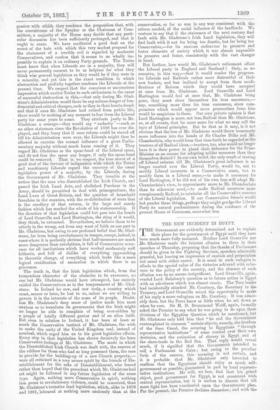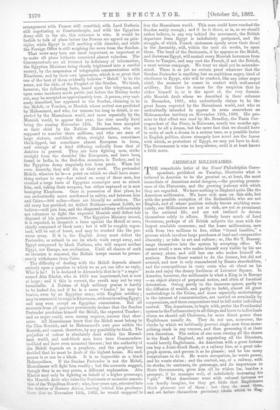THE NEW INCIDENT IN EGYPT.
THE Government are evidently determined not to explain their plans for the government of Egypt until they have been much more fully matured. Neither Lord Granville nor Mr. Gladstone made the faintest allusion to them in their speeches of Thursday, proposing that the thanks of Parliament should be given to the Fighting Services, speeches admirably graceful, but leaving an impression of caution and preparation not usual with either orator. It is usual in such eulogies to allude to the special value of the victories achieved with refer- ence to the policy of the country, and the absence of such allusion was by no means insignificant. Lord Granville, again, evaded Lord Salisbury's question as to future action in Egypt with an adroitness which was almost comic. The Tory leader had incidentally attacked Mr. Courtney, the Secretary to the Treasury, and Lord Granville seized the opportunity to make of his reply a mere eulogium on Mr. Courtney. It was admir- ably done, but the Peers knew as little when he sat down as when he rose. Sir H. D. Drummond Wolff, again, formally asked the Premier to say what he was going to do upon three divisions of the Egyptian Question which he mentioned, but Mr. Gladstone only told him that "he and the Government contemplated in common " certain objects, namely, the freedom of the Suez Canal, the securing to Egyptians "through representative institutions" of some control over their own destinies, and the extinction of slavery in Egypt and of the slave-trade in the Red Sea. That reply would reveal much, if it signified that the Government intended to call, a Parliament in Cairo ; but owing to the peculiar form of the answer, this meaning is not certain, and it is probable that Mr. Gladstone only intended to reaffirm that the Egyptians should enjoy as much self- government as possible guaranteed in part by local represen- tative institutions. He will, we fear, find that his grand object, good government for Egypt, is not consistent with central representation, but it is useless to discuss that till more light has been vouchsafed upon the Government plan. For the present, the Premier declines discussion.; and with the,
arrangement with France still unsettled, with Lord Dufferin still negotiating at Constantinople, and with • the Egyptian Army still in the air, this reticence is wise. It would be foolish to talk of plans before the Powers are agreed on prin- ciples, while Egypt is still seething with disordei, and while the Foreign Office is still weighing the news from the Soudan. That news may turn out most important, so important as to make all plans hitherto conceived almost valueless. The Correspondents are all fettered by deficiency of information, the Egyptian Ministers being clearly frightened into a careful secrecy, by the suspension of telegraphic communication with Khartoum, and by their own ignorance, which is so great that one of the best of them evidently believes " Mehdi " to be the name, not the title, of the Prophet of the Soudan. We think, however, the following facts, based upon the telegrams, and upon some incidents made public just before the Mutiny broke out, may be accepted as approximately true. A person, very vari- ously described, has appeared in the Soudan, claiming to be the Mehdi, or Teacher, or Messiah whose arrival was predicted by Mahommed, and who, for reasons too long to detail, is ex- pected by the Mussulman world, and more especially bY the , Moorish world, to appear this year, the date usually fixed being the coming November 12th, He has been accepted as their chief by the Nubian Mahommedans, who are supposed to number three millions, and who are men of large stature, coal-black skins, straight faces, sometimes thick-lipped, but sometimes almost European in form, and courage of a kind differing radically from that of Asiatics in general. They are born fighting men, strike straight from the shoulder like Europeans, and have beei. found in India, in the Red-Sea steamers, in Turkey, and in the Fgyptian Army singularly free from panic. When led even decently, they will die at their work. The pretended Mehdi, whoever he is—a point on which we shall have some- thing serious to say—has raised an army of these men, has crushed a large force of Egyptian conscripts sent to attack him, and, taking their weapons, has either captured or is now besieging Khartoum. Once in possession of that place, he can undoubtedly move northward in safety, and between him and Cairo-900 miles—there are literally no soldiers. The old army has perished, its drilled Nubians—about 3,500, we believe—will join him, and the dispersed soldiery will certainly not volunteer to fight the expected Messiah until defeat has disposed of his pretensions. The Egyptian Ministry intend, it is reported, to despatch a force against the Mehdi at once, chiefly composed of black men ; but it will be roughly organ- ised, will be out of heart, and may be crushed like the pre- vious army. If it is, the English Army must defeat the Pretender, or submit to see its whole work swept away, and Egypt conquered by black Nubians, who will respect neither Egypt, nor Europe, nor civilisation. Until all chance of such an invasion is removed, the British troops cannot be perma- nently withdrawn from Cairo.
The difficulty of dealing with the Mehdi depends almost entirely upon a question to which we as yet can offer no reply. Who is he ? It is declared in Alexandria that he is" a negro" named Abu Khelat, who in 1879 was imprisoned, but is now at large ; and if this is correct, the revolt may not be very formidable. A Nubian of high military genius is hardly to be looked for, and if he is a mere "leader," he may be beaten, even by an Egyptian army, with English artillery ; may be contented to reign in Khartoum, without invading Egypt; and may even accept an Egyptian commission. But all accounts from all quarters persistently declare that the Soudan Pretender proclaims himself the Mehdi, the expected Teacher ; and no negro could, even among negroes, assume that char- acter. All Mussulmans know that the Mehdi must belong to the Clan Koreish, and to Mahommed's own gets within the Koreish, and cannot, therefore, by any possibility be black. The prejudice of colour is absolutely dead within the Mussul- man world, and coal-black men have been Commanders- in-Chief and have even mounted thrones ; but the authority of the Mehdi depends on a prophecy, and the prophecy has decided that he must be Arab of the highest house. No such person is or can be a black. It is as impossible as a black Hohenzollern. If the Soudan Pretender is not the Mehdi, Mussulmans will fight him readily ; but the accounts suggest, though they in no way prove, a different explanation. Abu Khelat may only be fighting on behalf of a higher personage, the Moorish Arab who rules the Senioussia or monastic associa- tion of the Tripolitan Desert ; who, four years ago, retreated into the interior of Eastern Africa, leaving behind him proclama- tions that on November 12th, 1882, he would reappear; to free the Mussulman world. This man could have reached the Soudan easily enough ; and if he is there, or is, as we should rather believe, in any way behind the movement, the British departure from Egypt is indefinitely postponed, and the struggle, of which French statesmen openly avow their dread in the Assembly, will, within the next six weeks, be upon them. The head of the Senioussia, if he appears as the Mehdi, and threatens Egypt, will control every Moorish horseman from Barca to Tangier, and may cost the French, if not the British, a most serious campaign. We trust we shall not be misunder- stood. There is as yet no certain proof whatever that the Soudan Pretender is anything but an ambitious negro, tired of obedience to Egypt, who will be crushed, like any other negro chief, the moment he comes in contact with well-served artillery. But there is reason for the suspicion that he either himself is, •or is the agent of, the very formid- able Moorish Arab whom we described in these columns in December, 1881, who undoubtedly claims to be the great Imam expected by the Mussulman world, and who as undoubtedly intended to appear in arms somewhere on Mahommedan territory on November 12th, 1882, His pro- mise to that effect was read by Mr. Broadley, the Tunis Cor- respondent of the Times, in Kairouan, nearly ten months ago. It may be all a dream, but the mere fact that we should have to write of such a dream in a serious tone, as a possible factor in English politics, shows strangely how novel are the forces with which, as protectors of Egypt, we may yet have to deal. The Government is wise to keep silence, until it at least knows a little more.



































 Previous page
Previous page